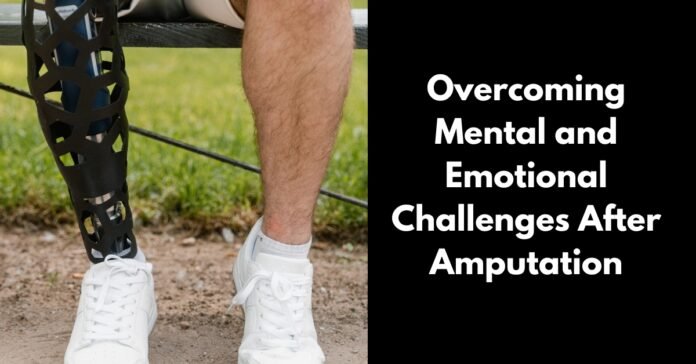Amputation can be a difficult and overwhelming experience, not just physically, but also emotionally. Losing a limb can change the way you live and interact with the world, leading to feelings of grief, frustration, and fear. However, with time, support, and the right resources, it’s possible to adjust to life after amputation and find ways to regain independence. This article will explore how you can overcome the mental and emotional challenges after amputation, including finding emotional support, rebuilding confidence, and adapting to your new lifestyle.
How Can You Overcome Mental and Emotional Barriers After Amputation?
1. Allow Yourself to Grieve
Grieving is a natural and necessary part of adjusting to any significant loss, including the loss of a limb. It’s important to acknowledge the pain, frustration, anger, and sadness that may come up. These feelings can arise in the days, weeks, and even months after amputation. Allow yourself to feel these emotions without guilt. Recognize that it’s okay to mourn the life you once knew, and give yourself permission to heal emotionally at your own pace.
2. Acknowledging and Accepting the New Reality
The first step in overcoming the emotional challenges of amputation is accepting the new reality. It’s normal to feel a range of emotions, from anger to sadness to confusion. Allow yourself time to grieve the loss of your limb; this is an essential part of the healing process. Acceptance doesn’t mean giving up, but rather acknowledging the change and beginning to embrace a new way of living. Understanding that it’s okay to feel upset or frustrated can help alleviate pressure and allow you to move forward more peacefully.
3. Seeking Emotional Support
Going through an amputation can be a lonely experience, but it’s important to know that you don’t have to do it alone. Emotional support from family, friends, or support groups can play a huge role in mental healing. Speaking with a counselor or therapist can help you process your feelings, deal with any anxiety or depression, and build resilience. Support groups, especially those specifically for amputees, provide a space to connect with others who understand exactly what you’re going through. They can share advice, coping mechanisms, and inspire you to stay positive and strong.
4. Adapting to a New Lifestyle
After an amputation, your daily routine will need to adjust to your new physical abilities. This may mean finding new ways to complete tasks, whether it’s cooking, working, or exercising. Adaptation takes time, and it’s important to be patient with yourself during this phase. Prosthetic limbs, for instance, can help regain mobility and independence, making it easier to resume activities you once enjoyed. Learning how to manage daily activities with the help of prosthetics can create a sense of normalcy and help rebuild your confidence.
5. Consider Therapy
Therapy is a valuable resource for individuals adjusting to amputation. A therapist can help you work through complex emotions, such as grief, anger, or even feelings of guilt or shame. Cognitive-behavioral therapy (CBT) can be especially helpful in reframing negative thought patterns and fostering healthier coping mechanisms. A therapist can also assist in managing trauma, stress, and any potential mental health issues like depression or anxiety.
6. Focus on Rehabilitation
Physical rehabilitation, including occupational therapy and physical therapy, plays a crucial role in regaining physical function and boosting emotional well-being. As you work towards regaining independence and learning new ways to complete tasks, setting small and realistic goals helps keep you motivated. Each achievement, no matter how minor it seems, contributes to a sense of accomplishment and progress.
7. Overcoming Social and Psychological Barriers
Many amputees struggle with social anxiety and fear of judgment after the loss of a limb. It’s common to feel self-conscious about how others perceive you, especially in public spaces. Overcoming these psychological barriers starts with building self-confidence. Be proud of the progress you’ve made and the strength it took to get there. People may ask questions, but remember that you don’t owe anyone an explanation.
8. Rebuilding Confidence Through Mobility
Prosthetics play a crucial role in rebuilding confidence after amputation. The ability to walk, run, or even engage in sports again is a powerful way to restore self-esteem and independence. Achieving mobility with the help of prosthetics can also positively impact your mental health by reducing feelings of helplessness.
The key is to start small and gradually challenge yourself as you become more comfortable. Each successful step you take builds not only physical strength but also confidence in your abilities. For those seeking prosthetic solutions, consulting a prosthetic limbs manufacturing company in India can ensure access to high-quality and customized prosthetics that meet your specific needs.
9. Recognize Positive Changes
Adjusting to life after amputation can lead to positive growth. Many people discover a newfound sense of strength and resilience after facing such a challenge. With time, you may notice that you are more patient with yourself, more compassionate, and able to adapt to new situations in ways you hadn’t imagined. Recognizing these positive changes helps shift your focus from what you’ve lost to what you’ve gained, boosting your self-esteem and resilience.
10. Maintain a Routine
Creating and sticking to a routine can be a powerful tool in dealing with uncertainty. Establishing a daily schedule helps provide structure, which can reduce feelings of anxiety or chaos. Having regular wake-up times, meals, and activities also helps bring a sense of normalcy and control, even when facing a major life transition.
Innovative Prosthetic Solutions for Sustainable Success
Life after amputation presents significant emotional and physical challenges, but these obstacles can be overcome with time, support, and the right strategies. The emotional process often begins with grief, and it’s important to allow yourself the space to mourn and accept the changes. Seeking support from family, friends, or professionals can help you navigate this journey. By focusing on both physical and emotional healing, individuals can find fulfillment and regain control of their lives.



